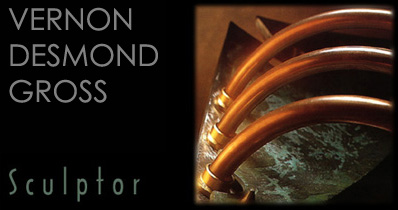
|
|
|
|
|
|
Imagine a civilization about which we know nothing. We can't even put it in a context of time or place. Now imagine that artifacts from that civilization have been found - ceremonial objects, totems, icons emblems that were perhaps carried in processionals.
The objects have a mysterious aura about them. They are elegant and fierce. Made of wood and stone and metal, they are sometimes layered as if one millennium added their own symbols on top of the last, each addition enriching the object and the mystery.
But, even though the objects are exotic and unknown, they somehow speak to us. It's as if their shapes and construction are vaguely remembered.
The objects come from a civilization that was obviously early industrial. But apparently this unknown society was not shaken by the technological revolution as ours has been. These objects seem confident and stable rather than self conscious. They also seem to have been made by people who hadn't divorced the sacred from the secular. In short, the objects seem to have been produced by a balanced society. And they appeal to our need for continuity and balance and our own longings for ritual and ceremony. These ceremonial artifacts appeal to us. For one thing, they are beautiful. They command any room in which they're placed. They draw our eyes. They whisper something to us.
In reality, of course, they did not come from another civilization. Rather, they were made by one of us in the language of modern art, where the context of time and place melts away to reveal our dreams, our pride, our intelligence and our majesty.
In
the end, these beautiful, strange objects remind us of a poem by Wordsworth
we read once a long time ago:
I
see what was, and is, and will abide;
Still
glides the stream, and shall for ever glide;
The
form remains, the function never dies;
While
we, the brave, the mighty and the wise;
We
men, who in the morning of our youth defied
The
elements, must vanish - be it so!
Enough
if something from our hands have power
To
live, and act, and serve the future hour;
And
if, as toward the silent tomb we go,
Through
love, through hope, and faith's transcendent dower,
We
feel that we are greater than we know.
Writing
on the works of Vernon Desmond Gross by Edward Bishop
Editor,
St. Louis Journalism Review
Professor
of Journalism, Webster University, St. Louis, Missouri
Site
Revised: 8.18.2012